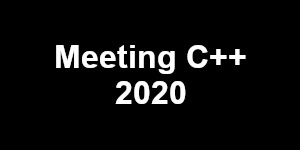Italian C++ Conference 2021 Call for sessions
The Italian C++ Conference 2021 is now putting together its program, and they want you to speak on C++. If you have something to share, check out their

Call for Sessions
by Marco Arena
About the conference:
The Italian C++ Conference 2021 will be online on June 19 and will host live sessions and networking on Remo.
The Italian C++ Conference is the biggest and most successful event organized by the Italian C++ Community and it is an environment where professionals, companies and students meet to share experience about C++ development and practices.
Since the first edition back in 2016, the conference has hosted amazing speakers like Andrei Alexandrescu, Walter Brown, Michael Wong, James McNellis, Bartosz Milewski, Ivan Čukić, Jens Weller, Phil Nash, Anastasia Kazakova, Peter Sommerlad, Rainer Grimm, Marc Goodner, Vittorio Romeo, and many more.
The Italian C++ Conference is put on by the Italian C++ Community and is open to anyone who wishes to be there either as a presenter or an attender.
The event will be free to attend.
The Call for Sessions will close on April 11 at 23:59 CET.


